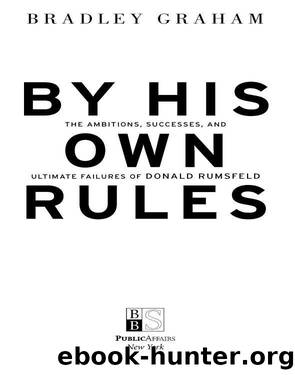By His Own Rules by Bradley Graham

Author:Bradley Graham
Language: eng
Format: epub
Publisher: PublicAffairs
Over the next few months, Bremer moved farther away from the idea of arranging for the transitional Iraqi authority that Garner and Khalilzad had pursued and that Rumsfeld and his staff thought was still a main objective. Bush had endorsed the plan for an Iraqi Interim Authority at an NSC meeting shortly before the invasion on March 10. But Bremer contends that by the time he was asked to take the CPA job in late April, fresh doubts had arisen—at least among some top U.S. officials—about trying for a rapid transfer of sovereignty.
While senior Pentagon officials still favored ceding authority early to a small group of Iraqi exiles, State Department and CIA officials were arguing again for a longer-term effort to manage the deep divisions in Iraqi society. Bremer understood from his discussions with Bush and from NSC meetings that the president had tilted toward the take-your-time advocates and had come to favor a longer-term process to build support for democracy in Iraq.
“Sometime after March 10—I’ve been told by various participants it was early April—Bush decided the idea of a short occupation and a quick handover wasn’t going to work,” Bremer said. “But the problem was, I don’t think it was ever documented. No one ever put a piece of paper in front of him and said, ‘Here’s the new guidance,’ and so there was a lot of confusion.”
Rumsfeld himself appeared somewhat ambivalent. Although he believed a sooner transfer was better than a later one, he was not as eager as Wolfowitz, Feith, or some conservatives outside the Pentagon, such as Richard Perle, to see an immediate handover. Rumsfeld’s initial focus was on ensuring U.S. forces were free to root out terrorist elements and locate suspected stockpiles of weapons of mass destruction. He worried that establishing a new Iraqi governing entity too soon could interfere with these efforts.
Rumsfeld also anticipated a lengthy new political process ahead in Iraq. In memos in May to the NSC and to Feith, he cautioned that the transition to democracy in Iraq would not happen fast or easily and urged that elections not be rushed. Feith recalls Rumsfeld expressing concern to him about the Iraqis pressing for power before they had expanded their leadership council. Noting reports of a lack of discipline among Iraq’s emerging leaders, Rumsfeld cautioned as well against creating an Iraqi governing entity that might undermine Bremer’s ability to do his job.
Nonetheless, Rumsfeld expected a relatively early turnover of sovereignty to the Iraqis and assumed that Bush’s approval of the plan to establish an Iraqi Interim Authority as soon as possible after liberation remained in force. Bremer, for his part, has pointed to a paper trail indicating that he kept Rumsfeld apprised of the shift in approach and that Rumsfeld raised no objection.
On May 22, for instance, Bremer outlined to Rumsfeld a plan to move first to a constitution and then to elections. Bremer wrote several more memos to Rumsfeld and the Pentagon through the rest of the spring and summer and
Download
This site does not store any files on its server. We only index and link to content provided by other sites. Please contact the content providers to delete copyright contents if any and email us, we'll remove relevant links or contents immediately.
| Afghan & Iraq Wars | American Civil War |
| American Revolution | Vietnam War |
| World War I | World War II |
Waking Up in Heaven: A True Story of Brokenness, Heaven, and Life Again by McVea Crystal & Tresniowski Alex(36999)
Empire of the Sikhs by Patwant Singh(22163)
We're Going to Need More Wine by Gabrielle Union(18066)
Hans Sturm: A Soldier's Odyssey on the Eastern Front by Gordon Williamson(16575)
Leonardo da Vinci by Walter Isaacson(11896)
The Radium Girls by Kate Moore(10902)
Educated by Tara Westover(7055)
Tools of Titans by Timothy Ferriss(6936)
How to Be a Bawse: A Guide to Conquering Life by Lilly Singh(6686)
The Last Black Unicorn by Tiffany Haddish(5065)
Permanent Record by Edward Snowden(4986)
The Rise and Fall of Senator Joe McCarthy by James Cross Giblin(4840)
Promise Me, Dad by Joe Biden(4440)
The Wind in My Hair by Masih Alinejad(4420)
The Crown by Robert Lacey(4099)
A Higher Loyalty: Truth, Lies, and Leadership by James Comey(4025)
The Iron Duke by The Iron Duke(3636)
Joan of Arc by Mary Gordon(3253)
How to be Champion: My Autobiography by Sarah Millican(3181)
